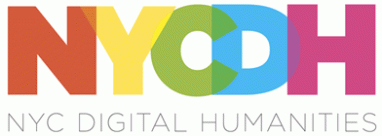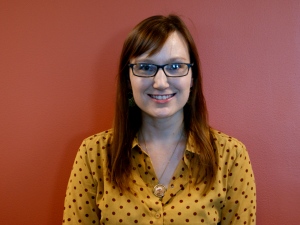
The NYCDH Inaugural Event took place last Saturday at the Humanities Initiative at New York University. Many attendees faithfully live-tweeted it at #nycdh, including a significant Fordham contingent: @kmapesy, @ecornell1, @mickimcgee, @diyclassics and @FordhamGSDH!
The two morning sessions on Building NYCDH were led by Lynne and Ray Siemens, two visiting professors from the University of Victoria, currently at NYU. They discussed the process of building and running a digital humanities center, and the importance of dialogue, discussion and re-discussion, and interdisciplinary and inter-departmental (or inter-institutional!) work for the success of any DH project. I can’t summarize their talks better than the working notes, so let me just say my biggest takeaway was that we may fail to conclusively define the digital humanities — and that’s okay, as long as we keep talking about it and trying to re-define it.
A summary of lightning talks on a variety of topics can alo be found in the working notes: the range of projects was fascinating, and a wonderful reminder of how lucky we are to be in a city like New York.
After the morning’s traditional conference presentations the afternoon was an unconference. It was the first time I’d been to an unconference — I’ve heard a lot about them, but hadn’t ever attended one. As it turns out, my unfamiliarity with the format ended up giving me a bit of a surprise!
During lunch, we wrote topics of interest on a whiteboard, and after lunch, we voted on which topics the group wanted most to discuss. I was excited that other people wanted to talk about “metadata and DH project sustainability,” and it got through to be one of the final four sessions. Then I found out I’d be leading it! Fortunately, it was during the second time slot, so I had a little bit of time to prepare. I have to admit, though, the first unconference session on pedagogy and DH drew me in pretty fast, and hearing the ways in which different people use DH tools in their classes, or even teach entire classes on the digital humanities, was fascinating, especially since I’m TA’ing this semester, and will be teaching my own classes next year.
The session on metadata was a small one, which isn’t all that surprising: not everyone is excited to talk about cataloging, project hosting and formatting our projects with the future in mind. But we had a good variety of people in the room, library school students and academics, those with years of experience with DH and with technology and programming and those who were just coming to the field.
We ended up talking not only about metadata and its importance (why create something, if no one can find it?) and the persistence of projects, but about the role of digital humanities more broadly in the world of scholarship. Questions of citation and of numbers of authors credited for a project came up, and the observation was made that the sciences seem to handle multiple-authorship more gracefully than the humanities. We also discussed the question of the tension between open access and traditional scholarly publishing, and whether the digital humanities have any obligation to be open access, especially when they draw on open access sources.
The conference’s closing remarks included a list of recommended resources, which are listed in the conference notes (linked above). At 5:30, we retired to the Swift Hybernian Lounge, just around the corner.
I would encourage anyone in the NYC area to join NYCDH.org and be part of the process of creating the NYC DH community! As a newly-formed group, the options for where it might go are still very flexible, and it promises to help draw together expertise and opportunities in really beneficial ways.

–Alisa Beer



